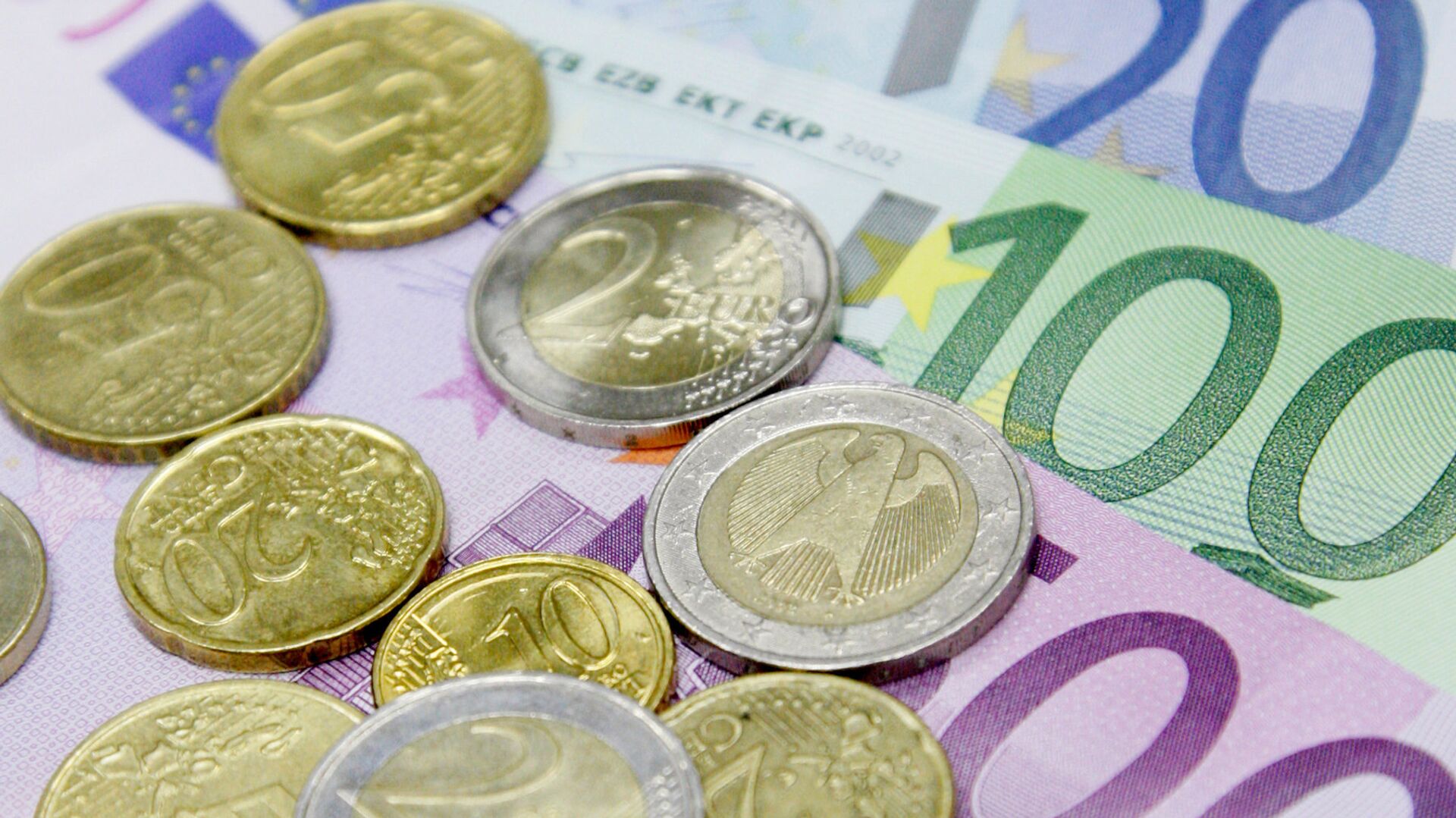https://sputnikglobe.com/20220129/eurozone-economies-up-for-tough-year-amid-concerns-over-supply-chains-consumption--inflation-1092603523.html
Eurozone Economies Up for Tough Year Amid Concerns Over Supply Chains, Consumption, & Inflation
Eurozone Economies Up for Tough Year Amid Concerns Over Supply Chains, Consumption, & Inflation
Sputnik International
One of Europe's biggest economies, Germany, showed a 0.7% decline in the last quarter of 2021 despite preliminary projections being much more optimistic. Two... 29.01.2022, Sputnik International
2022-01-29T11:36+0000
2022-01-29T11:36+0000
2023-04-12T17:14+0000
europe
covid-19
european union (eu)
https://cdn1.img.sputnikglobe.com/img/102495/97/1024959725_0:371:1805:1386_1920x0_80_0_0_eec2a784ed15626e01bcd544eaafec81.jpg
The Eurozone is up for a bad economic start in 2022, Bloomberg claims, citing various economic reports from local regulators and businesses. The economic woes that tanked its performance at the end of 2021 have apparently transitioned into 2022 and the International Monetary Fund has already cut the prognosis for the EU this year.The list of economic problems in the EU is nothing new. Inflation remains among the biggest concerns, although so far European governments do not see a need to change existing policies. One of the greatest issues – growing gas and energy prices – will burden EU consumers. Government subsidies will only be possible if gas prices soar even higher than they did in 2021, when they hit $2,000 per thousand cubic metres.Retailers and service providers also expect their prices to go up in the new year. At the same time, consumer activity is expected to decline amid skyrocketing prices and concerns about financial stability.European Businesses in Trouble?Manufacturers will also face hardships in 2022. The lack of a labour force is just one of the concerns that companies have expressed due to the need to quarantine one portion of staff, and losing another to illness.The issues with supply chains and bottlenecks in logistics are also not expected to be entirely gone this year either. While the survey of purchasing managers cited by Bloomberg, suggested that the supply chain issues should ease a bit in 2022, the shortages of microchips will likely continue throughout the year, impacting automakers.The report comes as economies in the EU demonstrate a slower pace of recovering from the negative effects of the pandemic compared to the US and the UK. Germany, the Eurozone's biggest economy showed a 0.7% decline in the fourth quarter of 2021 despite analysts predicting two-fold reduction in output. France and Spain fared better in that period with 0.7% and 2% GDP growth respectively, but their results were still lower than in the second and third quarters. Still, the latter pair's results in the fourth quarter exceeded economists' expectations giving a shimmer of hope for a fast recovery.
https://sputnikglobe.com/20220112/victory-over-covid-eus-top-medical-body-says-omicron-pushing-pandemic-toward-endemic-1092205249.html
Sputnik International
feedback@sputniknews.com
+74956456601
MIA „Rossiya Segodnya“
2022
Tim Korso
https://cdn1.img.sputnikglobe.com/img/07e6/03/0d/1093831826_0:0:216:216_100x100_80_0_0_e3f43a960af0c6c99f7eb8ccbf5f812c.jpg
Tim Korso
https://cdn1.img.sputnikglobe.com/img/07e6/03/0d/1093831826_0:0:216:216_100x100_80_0_0_e3f43a960af0c6c99f7eb8ccbf5f812c.jpg
News
en_EN
Sputnik International
feedback@sputniknews.com
+74956456601
MIA „Rossiya Segodnya“
Sputnik International
feedback@sputniknews.com
+74956456601
MIA „Rossiya Segodnya“
Tim Korso
https://cdn1.img.sputnikglobe.com/img/07e6/03/0d/1093831826_0:0:216:216_100x100_80_0_0_e3f43a960af0c6c99f7eb8ccbf5f812c.jpg
europe, covid-19, european union (eu)
europe, covid-19, european union (eu)
Eurozone Economies Up for Tough Year Amid Concerns Over Supply Chains, Consumption, & Inflation
11:36 GMT 29.01.2022 (Updated: 17:14 GMT 12.04.2023) One of Europe's biggest economies, Germany, showed a 0.7% decline in the last quarter of 2021 despite preliminary projections being much more optimistic. Two other economies, France and Spain, showed growth, but it was notably slower than the previous two quarters.
The Eurozone is up for a bad economic start in 2022, Bloomberg claims, citing various economic reports from local regulators and businesses. The economic woes that tanked its performance at the end of 2021 have apparently transitioned into 2022 and the International Monetary Fund has already cut the prognosis for the EU this year.
The list of economic problems in the EU is nothing new. Inflation remains among the biggest concerns, although so far European governments do not see a need to change existing policies. One of the greatest issues – growing
gas and energy prices – will burden EU consumers. Government subsidies will only be possible if gas prices soar even higher than they did in 2021, when they hit $2,000 per thousand cubic metres.
Retailers and service providers also expect their prices to go up in the new year. At the same time, consumer activity is expected to decline amid skyrocketing prices and concerns about financial stability.
European Businesses in Trouble?
Manufacturers will also face hardships in 2022. The lack of a labour force is just one of the concerns that companies have expressed due to the need to quarantine one portion of staff, and losing another to illness.
The issues with
supply chains and bottlenecks in logistics are also not expected to be entirely gone this year either. While the survey of purchasing managers cited by
Bloomberg, suggested that the supply chain issues should ease a bit in 2022, the shortages of microchips will likely continue throughout the year, impacting automakers.

12 January 2022, 13:12 GMT
The report comes as economies in the EU demonstrate a slower pace of recovering from the negative effects of the pandemic compared to the US and the UK. Germany, the Eurozone's biggest economy showed a 0.7% decline in the fourth quarter of 2021 despite analysts predicting two-fold reduction in output. France and Spain fared better in that period with 0.7% and 2% GDP growth respectively, but their results were still lower than in the second and third quarters. Still, the latter pair's results in the fourth quarter exceeded economists' expectations giving a shimmer of hope for a fast recovery.



